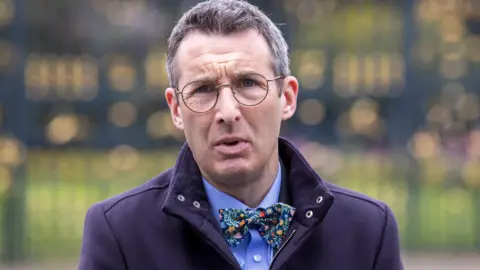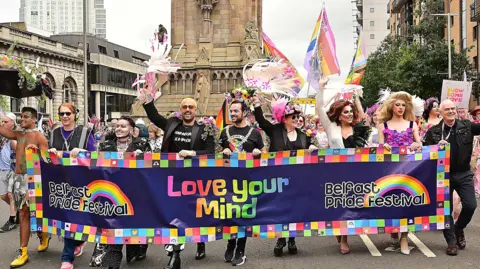Concern over 'toxic discourse' around puberty blockers
 PA Media
PA MediaThere is a "toxic discourse" within politics and the media around the issue of puberty blockers, the agriculture minister has said.
Andrew Muir said he was "really concerned" about the impact of this on transgender and non-binary people.
In December, the four parties in the NI Executive voted to introduce an indefinite ban on the sale or supply of puberty blockers to anyone under the age of 18.
Muir's comments came after organisers of some LGBT+ festivals in Northern Ireland said political parties that supported the ban would not be invited to take part in their Pride events this year.
Muir acknowledged that the ban on puberty blockers had caused "hurt and anguish" in the trans and non-binary community.
"I think we can learn lessons about this, especially around the communication around this," he told BBC News NI's Good Morning Ulster.
Puberty blockers work by suppressing the release of hormones and can be prescribed to children questioning their gender.
Muir emphasised that the decision to ban them was taken "in the context of the science and evidence that was presented to the executive".
He said he had asked the health minister to publish the evidence.
Pride parades
Among those who have told political parties not to attend are Foyle Pride, Causeway Pride and Mid and East Antrim Pride. Belfast Pride, NI's largest event, have said it has not yet made a decision on this matter.
Last week, on social media platform X, Alliance councillor and Belfast Lord Mayor Micky Murray said "no one" would dictate if he could attend a pride march.
"I proudly led the Belfast Pride march last year, as the first openly-gay Lord Mayor of Belfast," he wrote.
"I'm a seasoned rights campaigner, who has been at the forefront of every campaign."
 Pacemaker
PacemakerMuir said he had attended Pride since 1996 and it was "incredibly important to [him] as an openly-gay man".
He said he was yet to make a decision on whether he will attend a Pride event this year.
However, he said that if a decision was made to ban political parties from an event he planned to go to, "it would be a clear message that [he] would not be welcome" and he "would probably stay at home".
Puberty blockers in Northern Ireland
Until the ban in Northern Ireland, puberty blockers were only available on NHS prescription for under-18s, for those young people who were accepted onto the Child and Adolescent Mental Health Services Gender Identity Service endocrine pathway prior to March 2020.
It is understood children already on this medical pathway will continue to receive treatment.
Hormone suppressors also remain available for patients receiving the drugs for other uses, such as early-onset puberty.
The move to ban puberty blockers came after a report into children's gender services - the Cass Review - said there were "gaps in evidence" around the drugs.
The review was led by leading paediatrician Dr Hilary Cass and prompted the last government to ban the use of puberty blockers for under-18s questioning their gender – a move which was then supported by Labour when they won the election.
